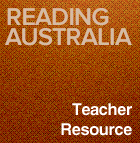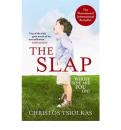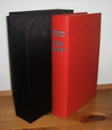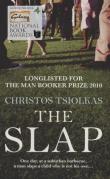AustLit
Latest Issues
AbstractHistoryArchive Description
'At a suburban barbecue, a man slaps a child who is not his own.
'This event has a shocking ricochet effect on a group of people, mostly friends, who are directly or indirectly influenced by the event.
'In this remarkable novel, Christos Tsiolkas turns his unflinching and all-seeing eye onto that which connects us all: the modern family and domestic life in the twenty-first century. The Slap is told from the points of view of eight people who were present at the barbecue. The slap and its consequences force them all to question their own families and the way they live, their expectations, beliefs and desires.
'What unfolds is a powerful, haunting novel about love, sex and marriage, parenting and children, and the fury and intensity - all the passions and conflicting beliefs - that family can arouse. In its clear-eyed and forensic dissection of the ever-growing middle class and its aspirations and fears, The Slap is also a poignant, provocative novel about the nature of loyalty and happiness, compromise and truth.' (Publisher's blurb)
Adaptations
-
form
y
 The Slap
Tony Ayres
,
Australia
:
ABC Television
Matchbox Pictures
,
2011
Z1699408
2011
series - publisher
film/TV
'The series starts at an Australian backyard BBQ. Amongst alcohol, friendship and a children's cricket game a man slaps a child who is not his son. The party comes to a sudden halt. The child's parents are so affronted they vow to take the man to court. As the series unfolds the police become involved and friends and family are forced to take sides. One cousin is forced to testify against another. Couples are caught in the crossfire. Beliefs are tested and relationships strained.
The Slap
Tony Ayres
,
Australia
:
ABC Television
Matchbox Pictures
,
2011
Z1699408
2011
series - publisher
film/TV
'The series starts at an Australian backyard BBQ. Amongst alcohol, friendship and a children's cricket game a man slaps a child who is not his son. The party comes to a sudden halt. The child's parents are so affronted they vow to take the man to court. As the series unfolds the police become involved and friends and family are forced to take sides. One cousin is forced to testify against another. Couples are caught in the crossfire. Beliefs are tested and relationships strained.
'The story is told through the points of view of eight characters as the court case proceeds, as affairs begin and end, as a pregnancy is decided and marriages morph and change. Each character's life is profoundly affected by "the slap", and each of the main character is metaphorically slapped as they are forced to face up to fundamental truths about themselves.'
Source: The Slap website http://www.abc.net.au/tv/theslap/about/ (Sighted 11/10/2011)
-
form
y
 The Slap
( dir. Lisa Cholodenko
)
United States of America (USA)
:
Matchbox Pictures
Universal Television
NBC
,
2015
8280562
2015
series - publisher
film/TV
The Slap
( dir. Lisa Cholodenko
)
United States of America (USA)
:
Matchbox Pictures
Universal Television
NBC
,
2015
8280562
2015
series - publisher
film/TV
'Meet Hector [...], a public servant, husband, father and valued friend on the cusp of his 40th birthday. Meet Aisha [...], Hector's beautiful and intelligent wife who is planning his party filled with friends and his very boisterous Greek family. Sounds like the makings of a great day, right? Wrong.
'As Hector tries to navigate family politics, awkward friendships and the young woman he is dangerously captivated by, the built-up tension explodes when Hector's hotheaded cousin slaps another couple's misbehaving child. Everyone is understandably stunned, and the party abruptly ends with the child's parents vowing legal action. What the hosts and guests don't know, however, is that this moment will ignite a chain of events that will uncover long-buried secrets within this group of friends and family... and vigorously challenge the core values of everyone involved.'
Source: NBC (http://www.nbc.com/the-slap). (Sighted: 3/2/2015)
Reading Australia
This work has Reading Australia teaching resources.
Unit Suitable For
AC: Year 11 (Literature Unit 3). This unit could be suitably adapted for study at a tertiary level also.
Themes
Australian identity, families, identity, middle class values, morality, multiculturalism, relationships
General Capabilities
Critical and creative thinking, Ethical understanding, Information and communication technology, Intercultural understanding, Literacy
Notes
-
Ranked #8 in ABC1's First Tuesday Book Club '10 Aussie Books to Read Before You Die' 2012 voting ballot.
Publication Details of Only Known VersionEarliest 2 Known Versions of
Other Formats
- Sound recording (read by Alex Dimitiades),
- Braille.
- Large print.
- Dyslexic edition.
Works about this Work
-
Man on a Mission
Rachel Cook
(interviewer),
single work
interview
— Appears in: Melbourne Community Voice , 13 June no. 597 (p. 12-13) -
Christos Tsiolkas's Style
2021
single work
criticism
— Appears in: JASAL , vol. 21 no. 1 2021;'This article takes up a specific feature of Christos Tsiolkas's writing, his style. Focusing on Tsiolkas's fourth novel, The Slap, this article argues that Tsiolkas’s style is an inarticulate style: a style that does not always use the right word at the right moment, that employs language for narrative utility rather than its own sake, and that sporadically departs from standard usage and correctness in ways that do not appear artistically motivated. My argument is that The Slap is notable among contemporary fiction in that what I consider to be Tsiolkas’s worst sentences are the most revealing of his inclinations as a novelist. Consequently, I depart from what has become a standard formula in Tsiolkas's reception, that where Tsiolkas succeeds as a writer he succeeds in spite of his style. Finally, this article also contributes to recent debates about the purpose and vocabulary of Australian literary discussion: how critics debate the work of a prize-winning author, how criticism and praise operate in critical judgements, and the significance of style in evaluations of literature.' (Publication abstract)
-
Narrative Empathy in Contemporary Australian Multiperspectival Novels : Cognitive Readings of Christos Tsiolkas’s The Slap and Gail Jones’s Five Bells
2021
single work
criticism
— Appears in: The Rise of the Australian Neurohumanities : Conversations Between Neurocognitive Research and Australian Literature 2021;'In this chapter, I approach contemporary Australian multiperspectival novels, i.e. texts in which the reader accesses the storyworld through different focalisers, from the perspective of narrative empathy. I argue that narrative empathy as a result of a text’s multiperspectivity can arise primarily if the narrative foregrounds conflict between focalisers. To illustrate this, I offer readings of Christos Tsiolkas’s The Slap (2008) and Gail Jones’s Five Bells (2011). Narrative empathy features differently in the two novels. While The Slap indeed invites readers to feel empathy on the basis of the multiperspectival structure of the text, this is not the case in Five Bells, since the narrative does not exacerbate conflict in the same way as Tsiolkas’s narrative does. At the same time, I suggest that it fulfils similar functions in both texts in that its main aim is to foster greater understanding for those whose subjectivities are marginalised within society.'
Source: Abstract.
-
y
 Novel Politics : Studies in Australian Political Fiction
Carlton
:
Melbourne University Press
,
2020
18807115
2020
multi chapter work
criticism
Novel Politics : Studies in Australian Political Fiction
Carlton
:
Melbourne University Press
,
2020
18807115
2020
multi chapter work
criticism
'Percy Bysshe Shelley once described poets as the 'unacknowledged legislators of the world'. If this is true, Australian political scientists have shown curiously little interest in the role that literary figures play in the nation's political life.
'Novel Politics takes the relationship between literature and politics seriously, analysing the work of six writers, each the author of a classic text about Australian society. These authors bridge the history of local writing, from pre-Federation colonial Australia (Catherine Spence, Rosa Praed and Catherine Martin) to the contemporary moment (Tim Winton, Christos Tsiolkas and Kim Scott). Novel Politics unpicks the many political threads woven into these books, as they document the social world as it exists, while suggesting new possibilities for the nation's future. As political commentators of a particular kind, all six authors offer unique insights into the deeper roots of politics in Australia, beyond the theatre of parliament and out into the wider social world, as imagined by its dreamers and criticised by its most incisive discontents.'(Publication summary)
-
Living in a Hyphe-Nation : Exploring the Greek-Australian Identity through Literature
2017
single work
essay
— Appears in: Meanjin Online 2017;
-
Untitled
2008
single work
review
— Appears in: Bookseller + Publisher Magazine , September vol. 88 no. 3 2008; (p. 32)
— Review of The Slap 2008 single work novel -
When the Smoke Clears
2008
single work
review
— Appears in: The Sydney Morning Herald , 3 November 2008; (p. 32-33)
— Review of The Slap 2008 single work novel -
Barbecue Stopper
2008
single work
review
— Appears in: The Sunday Mail , 9 November 2008; (p. 18)
— Review of The Slap 2008 single work novel -
The Hand That Wrecked the Barbie
2008
single work
review
— Appears in: The Age , 8 November 2008; (p. 23)
— Review of The Slap 2008 single work novel -
Smack Dab in the Middle Class
2008
single work
review
— Appears in: The Weekend Australian , 8-9 November 2008; (p. 13)
— Review of The Slap 2008 single work novel -
A Slap in the Face
2008
single work
column
— Appears in: The Advertiser , 22 November 2008; (p. 11) -
The Passion of Christos
2008
single work
biography
— Appears in: Good Weekend , 13 December 2008; (p. 27-28, 31) -
Novel Touches on Country's Nerves
2009
single work
column
— Appears in: The Australian , 12 March 2009; (p. 4) -
Prize for Tsiolkas
2009
single work
column
— Appears in: The Sydney Morning Herald , 12 March 2009; (p. 16) -
Franklin Listing Tops Tsiolkas's Big Week
2009
single work
column
— Appears in: The Sydney Morning Herald , 13 March 2009; (p. 16)
Awards
- 2010 shortlisted Galaxy National Book Awards — Galaxy International Author of the Year
- 2010 longlisted The Booker Prize
- 2010 winner Australian Book Industry Awards (ABIA) — International Success Award
- 2010 longlisted International IMPAC Dublin Literary Award
- 2009 winner Australian Booksellers Association Awards — Booksellers Choice Award
- 2000s














